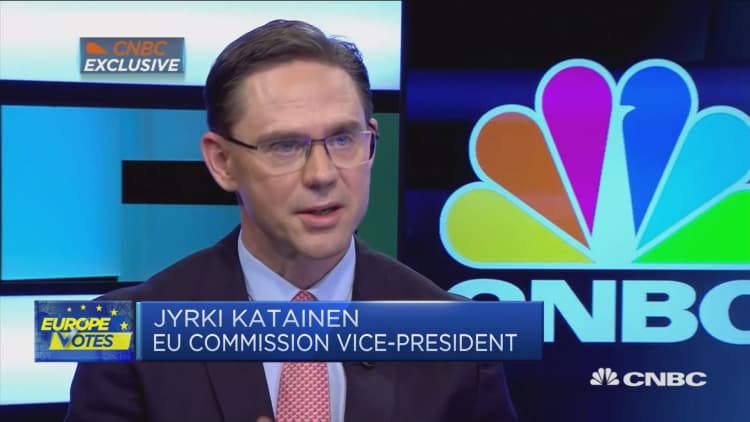
There is at least one thing in common between the U.S. and Russia — their willingness to weaken the European Union, a high-ranking European official told CNBC.
As European voters prepare to head to the polls later this week and choose new lawmakers to the European Parliament, there is a lot of debate about the challenges within the 28-member union. However, Jyrki Katainen, vice president of the European Commission told CNBC Tuesday that the external challenges have never been so hard.
"Countries like Russia, China but also the United States have challenged us harder than before," Katainen said in Brussels.
"We are (for the) first time in the history in a situation where the President of the United States and (the) President of Russia seem to share the same view on Europe: the weaker, the better, because they think that it's better for their own country, which is obviously not right," Katainen, who is also the former prime minister of Finland said.
The transatlantic relationship has been particularly challenging for the EU since President Trump came into power in 2016. Their differences have been clear on issues such as climate change and trade.
But the EU's relationship with Russian President Vladimir Putin is yet another challenge.
The EU has essentially been at odds with Russia, particularly since 2014, when Moscow annexed Crimea and the 28-member bloc decided to impose sanctions against the Kremlin.
According to Katainen, Russia is also responsible for boosting some populist parties, which are shaking the EU and represent an internal challenge.
"The EU is also challenged from within," Katainen said in reference to the nationalist rhetoric surging across the EU.
"(These parties) want to weaken and fragment the EU – and some of those have also very close connection to Russia, to President Putin. So Russia has obviously financed some of those parties, they have interfered to our democratic processes, for instance referenda or national elections in order to weaken the EU, in order to create division between the people inside the country," he said, describing this issue as "very dangerous."
The Kremlin's press office told CNBC that it does not agree with these comments. "The European Union is the main trade and economic partner of the Russian Federation and therefore Russia is interested in (a) united and thriving Europe," the Kremlin said in a statement via email.
In Austria, the European elections have been clouded by a scandal involving the country's deputy prime minister. Heinz-Christian Strache, leader of the far-right Freedom Party, was forced to resign after a video showed him proposing government contracts to a supposed Russian oligarch's niece.
Opinion polls have suggested that nationalist parties could gain as much as 30% of seats in the European Parliament after this week's election.
However, Katainen sounded relieved that despite their growing size in EU politics, the majority in the European Parliament and most European governments are still pro-EU.


